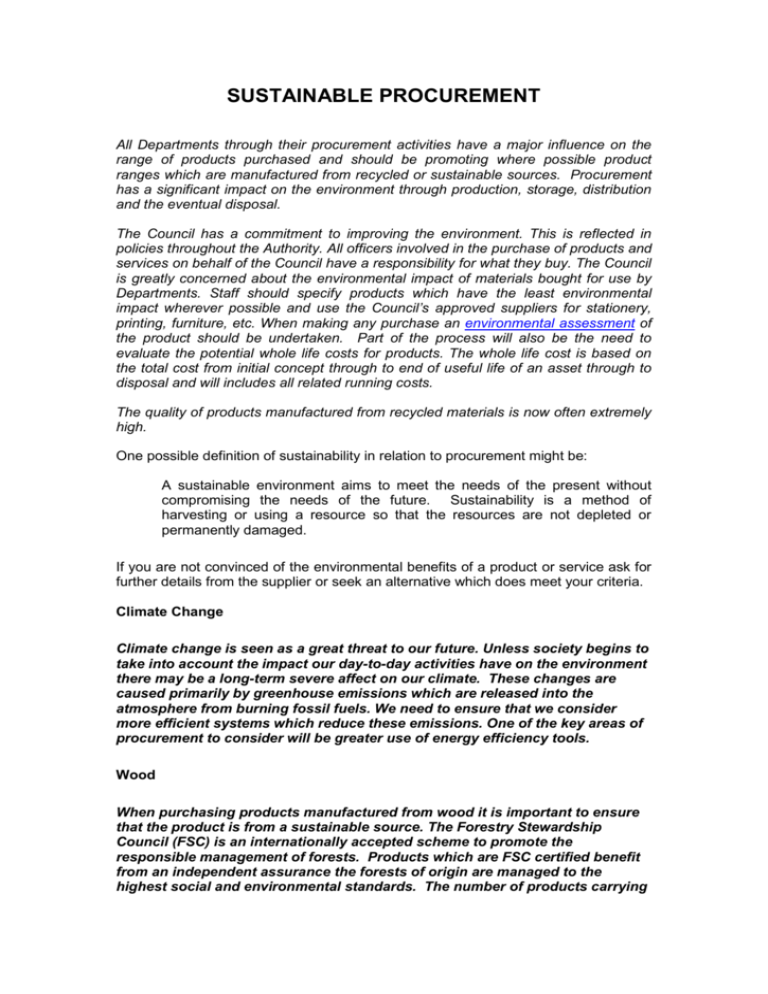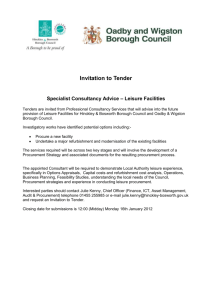sustainable procurement - Richmond upon Thames Schools Website
advertisement

SUSTAINABLE PROCUREMENT All Departments through their procurement activities have a major influence on the range of products purchased and should be promoting where possible product ranges which are manufactured from recycled or sustainable sources. Procurement has a significant impact on the environment through production, storage, distribution and the eventual disposal. The Council has a commitment to improving the environment. This is reflected in policies throughout the Authority. All officers involved in the purchase of products and services on behalf of the Council have a responsibility for what they buy. The Council is greatly concerned about the environmental impact of materials bought for use by Departments. Staff should specify products which have the least environmental impact wherever possible and use the Council’s approved suppliers for stationery, printing, furniture, etc. When making any purchase an environmental assessment of the product should be undertaken. Part of the process will also be the need to evaluate the potential whole life costs for products. The whole life cost is based on the total cost from initial concept through to end of useful life of an asset through to disposal and will includes all related running costs. The quality of products manufactured from recycled materials is now often extremely high. One possible definition of sustainability in relation to procurement might be: A sustainable environment aims to meet the needs of the present without compromising the needs of the future. Sustainability is a method of harvesting or using a resource so that the resources are not depleted or permanently damaged. If you are not convinced of the environmental benefits of a product or service ask for further details from the supplier or seek an alternative which does meet your criteria. Climate Change Climate change is seen as a great threat to our future. Unless society begins to take into account the impact our day-to-day activities have on the environment there may be a long-term severe affect on our climate. These changes are caused primarily by greenhouse emissions which are released into the atmosphere from burning fossil fuels. We need to ensure that we consider more efficient systems which reduce these emissions. One of the key areas of procurement to consider will be greater use of energy efficiency tools. Wood When purchasing products manufactured from wood it is important to ensure that the product is from a sustainable source. The Forestry Stewardship Council (FSC) is an internationally accepted scheme to promote the responsible management of forests. Products which are FSC certified benefit from an independent assurance the forests of origin are managed to the highest social and environmental standards. The number of products carrying the FSC Certification is increasing year on year. The Councils policy is to avoid purchasing equipment and furniture containing tropical hardwoods, including veneers. The use of tropical hardwoods from certified sustainable sources is permitted subject to Member approval Details of the Forestry Stewardship Council timber labelling scheme: www.fscuk.info Product Promotion The promotion and marketing of any products and services which promote sustainability is encouraged. Promotion is two fold: Firstly there are the products and services which we use in the Borough on a day-to-day basis, i.e. stationery, where staff need to be aware of the product availability and requirement to order from approved sources. Core items from our corporate stationery contract take account of sustainable issues within the evaluation criteria. In particular the price list identifies products with environmental benefits with the prefix “env” or “envt”. Secondly there are now a number of products available which the Borough uses which may need to be promoted/explained to residents to increase their awareness of what the council is doing, i.e. recycled materials used in highway construction. It is recommended that Departments consider the option of swapping nonenvironmental products for green versions, in particular where there are no cost implications. We all need to take responsibility to promote/communicate information to our end users and clients with regards to sustainable procurement policies. WEEE Directive The Waste Electronic and Electrical Equipment (WEEE) Directive requires manufacturers to be responsible for the disposal and recovery of materials. This new directive will have a significant impact on the procurement cycle for new products. Suppliers will need to consider the cost of disposal through the supply chain. Issues around this directive will have an impact on consumers as they continue to update their electronic equipment to keep apace of the technology without regard for the disposal of their existing equipment. For further information please use the following link to the Department of Trade and Industry website: www.dti.gov.uk/sustainability/weee/ Recycle It Now has additional links with regards to the new WEEE Directive: http://www.recycleitnow.org.uk/index2.html The London Green Procurement Code The London Green Procurement Code was launched by the Mayor for London in 2001. The scheme is run by London Remade and was written in co-operation with the Chartered Institute of Purchasing and Supply (CIPS). The code is aimed at all businesses in London. Nearly 400 businesses have already signed up to the code. The prime aim of the code is to promote the use of products manufactured from recycled materials. The London Green Procurement Code is being seen as a useful tool by various businesses in London. Within the Code there are the following four categories of membership. Part A is in two parts and follows a Commitment to engage with London Remade to explore practical opportunities for purchasing products made from recycled products. Part B is also in two parts and is the next step where the borough would commit to providing a baseline of data on current purchases leading to a commitments to measurable targets. Significantly, the boroughs which have signed up to the Code are already jointly contracting for some of the products being promoted by the Code. Richmond is currently signed up to level A2 with a commitment to explore practical opportunities for specifying and purchasing products made from recycled products. For further details on London http://www.londonremade.com/ Remade please see their website: The Mayors Office has details on the environmental policies and strategy for London. www.london.gov.uk/mayor/environment/strategy.jsp How to Evaluate Environmental Risk Environmental considerations need to be considered at the outset of any procurement process. As part of an environmental assessment the use of a matrix can help measure risk and make informed decisions for a particular contract or service. The IDeA have produced Guideline’s for Environmental Purchasing (for further information please follow the attached links http://www.ideaknowledge.gov.uk/idk/aio/69800 and http://www.ideaknowledge.gov.uk/idk/aio/69979).The guidance includes a Green Purchasing Risk Matrix for assessing the environmental risk for various groups of products and services. On the model the product or service is plotted on a high low matrix which will quantify the potential environmental risks. It is recommended that this matrix should be used to plot the potential risks prior to procuring goods and services for the Borough. The criteria used to establish the decision should be retained to form an audit trail. When starting a new procurement the IDeA have suggested that the decision can be classified as having a high or low environmental risk in terms of the : sustainability of the raw materials used energy consumed in the conversion process environmental impact ‘in use’ ability to be re-used or recycled biodegradability at the end of its useful life. Procurement processes can also be classified as having a high or low profile risk in terms of: publics perception of whether a purchase is environmentally friendly potential for adverse publicity associated with the purchase potential to detract from the Boroughs own environmental policies and practices. The ‘environmental risk’ is relative and will be concerned with actual knowledge of the environmental processes. While the ‘profile risk’ is concerned with perceptions of those outside the organisation and what they think the organisation should be doing. This may or not be based on an informed decision and has the potential for adverse publicity which will detract from other good environmental procurement practices. Using a matrix helps to develop the appropriate procurement strategies for the Borough or frame a particular purchase within the matrix. A selection of services are listed below. These categories of contracting which have been positioned in a hi-lo matrix to illustrate the perceived risks. Your own perceptions may be different but depending on where your procurement is in the framework you should consider the environmental implications in terms of your selection of product, supplier and supply chain issues ( eg safety, shipping, storage, disposal etc). For example a dishwasher will have a dual effect on the environment. Firstly there is the impact from manufacturing process of the equipment which will include the cost of the extracting the raw materials through to the shipping to the retailer and subsequently to the installation. Secondly once installed the usage of the equipment will impact on the amount of water and cleaning materials used. There will also be issues with regards to the long-term environmental impact from the waste disposal. Environmental Risk Hi Lo Advertising & Design Services Bitumen Macadam Bulk Container Bins Catering Franchise Electrical Equipment Grounds Maintenance Ready Mix concrete Rock/road salt Printer toners Street lighting Aggregates Batteries Cleaning Materials /Services Economic Appraisals Dishwashers Energy/Utilities Heating oil IT Equipment Solvents, Paints & Oils Photocopiers Timber Tyres Vehicle maintenance Waste Disposal Works contracts Agency staff Brushes Cash Collection services. Children’s play areas Conveyance of Dead Bodies Corporate Uniforms Design & Place Advertisements Fire equipment Fitness Equipment Hall Lettings Protective Gloves Reprographics machinery Advertising & Design Services Event organisers Floor coverings Floral Decorations Graffiti Removal/ Obliteration Mobile communications Paper Plastic sacks Recycling contracts Security Services Stationery Street furniture Taxi Services Lo Hi Profile Risk For further details on the on the IDEA’s environmental procurement policies. www.idea.gov.uk/procurement Environmental Performance Information There is a need for information with regards to environmental performance to be fed into the Councils annual Environmental Sustainability Report. It is important that we promote how good we are in certain areas to show how well we purchase goods and services. For a number of years the Borough has been very successful in some areas e.g. the adoption of paper manufactured from 100% post consumer waste. However also need to be aware that there may be environmental products were we have not been so successful in promoting e.g. recycled toner cartridges. Useful environmental websites The following websites offer additional background information on environmental and sustainability issues. Ecoaction support the London Borough of Richmond’s environmental and sustainable initiatives: www.ecoaction.richmond.gov.uk/ London Remade supporting the Mayors Green Code and general advice on environmental issues: www.londonremade.com Envirowise offer environmental www.envirowise.gov.uk Details on the new Waste Electrical and Electronic Equipment (WEEE) Directive. www.dti.gov.uk/sustainability/weee/ The Department for Trade and Industry (DTI) website has guidance on sustainability issues , including advice to businesses http://www.dti.gov.uk/sustainability/index.htm The Environment Agency offers advice from Central Government: www.environment-agency.gov.uk/ The Forestry Stewardship Council (FSC) promotes the sustainable use of timber through certification of timber : www.fsc-uk.info The Improvement and Development Agency (IDEA) offers advice to Local Government on www.idea.gov.uk/procurement The Mayor for London with details on the various environmental initiatives currently being developed: www.london.gov.uk/mayor/environment/strategy.jsp Useful link to the NHS website with additional background information: http://www.pasa.doh.gov.uk/sustainabledevelopment Recycle It Now has links to information on recycling and the WEE Directive. http://www.recycleitnow.org.uk/index2.html The Sustainable Development http://www.sd-commission.org.uk/ advise to Commission business: website:







